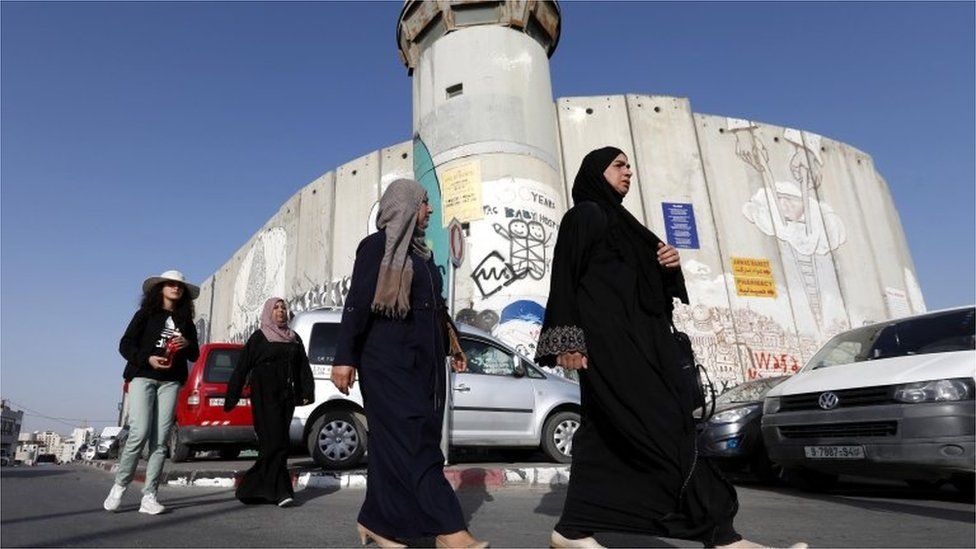Trump's 'deal of the century' falls flat in West Bank
- Published

More than two years after US President Donald Trump promised a plan to end the decades-old Israel-Palestinian conflict, the first stage is being officially revealed at an economic workshop in Bahrain.
A 40-page document, "Peace to Prosperity", just published by the White House, outlines an ambitious vision for $50bn investment in the Palestinian Territories and neighbouring Arab countries.
"It has the ability to fundamentally transform the West Bank and Gaza and to open a new chapter in Palestinian history - one defined, not by adversity and loss, but by freedom and dignity," it reads.
Jared Kushner, Mr Trump's son-in-law and the architect of the plan, told Reuters news agency that it could be the "opportunity of the century" for Palestinians.
Is Palestinian-Israel peace plan out of reach?
Many of the 179 projects listed in his new paper - such as a highway and possible rail link between the West Bank and Gaza - have previously been suggested.
However, the language is vaguer than that used by past peace brokers - disclosing little about the political aspect of the plan, which is expected to be released later this year.
'Business under occupation'
There is no mention of statehood - a Palestinian aspiration that has underpinned previous peace plans but which the White House has yet to commit to - or significant investment in East Jerusalem, which the Palestinians want as capital of their hoped-for future state.
It skirts around issues such as Israeli settlements in occupied territory, Palestinian refugees, establishing mutually agreed borders and addressing Israel's security concerns.
That leaves many ordinary Palestinians deeply sceptical.
"From what we saw when [Trump] became president, unfortunately he's done nothing to help the Palestinian economy," says Issam Rbaiya, a fruit and vegetable seller from the village of Urtas.
Rbaiya complains that water shortages and settlement growth have made it impossible for him to make a living by farming his family land. Settlements are seen as illegal under international law but Israel disagrees and the US has recently held off criticising them.
"Doing business in this country is unlike anywhere else in the world. We are a Palestinian business under occupation," says Mdees Khoury at the Taybeh brewery, near Ramallah.
Mr Kushner said it could create 1m jobs in the West Bank and Gaza
Instead of promising aid or outside investment, she says, a lot could be achieved by finding ways to ease Israeli restrictions - measures Israel says are for its own protection.
For her firm, these can mean costly delays in imports of hops, malt and yeast as well as in distribution to local and foreign markets, which is via Israeli checkpoints and ports.
"There needs to be international pressure on the Israelis to loosen up because Palestinians are very smart people, they're very determined and if they just get the chance to be left alone they could thrive and succeed," she says.
Palestinian boycott
Palestinian leaders - who have cut off ties with Washington, accusing it of being biased towards Israel - were quick to dismiss the new economic blueprint.
"OK, we need economic help, the money and the assistance but before everything we need a political solution," Palestinian Authority President Mahmoud Abbas told foreign journalists in a rare news conference at his Ramallah headquarters on Sunday.
"I cannot imagine the Manama workshop will produce any results because it was based on a mistake."
The Palestinians are still reeling from a series of dramatic announcements by the Trump administration, which include shutting their diplomatic office in Washington, cutting aid and trying to sideline the UN agency for Palestinian refugees.
While many wealthy and influential Arab countries will be represented at the Bahrain gathering, expectations are low that it can raise significant funding or political support.
Nobody from the Palestinian or Israeli governments will be present - the Palestinians boycotted the conference, and the US decided not to invite Israel if the Palestinians were not going to be there.
However, Israel, which has a close relationship with the Trump White House, is promising to be receptive.
"In general, I would say that we'll hear the American proposition, hear it fairly and with openness," Israel's Prime Minister Benjamin Netanyahu said.
"I cannot understand how the Palestinians before they even heard the plan, rejected it outright. That's not the way to proceed."
The sensitive, political part of the White House peace proposal has been repeatedly delayed - most recently by Israel's decision to hold a second general election this year.
Mr Kushner has acknowledged the US cannot implement his economic vision by itself but insists he wants to start building support and that he has come up with a game-changing formula.
- Published24 June 2019
- Published17 May 2019
- Published30 April 2019
- Published7 April 2019
- Published12 April 2019
- Published30 October 2014